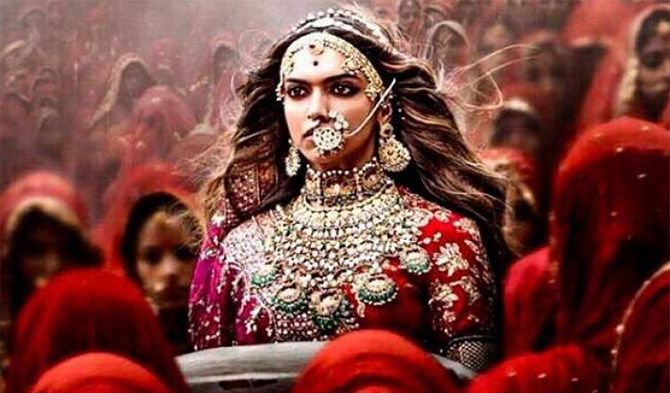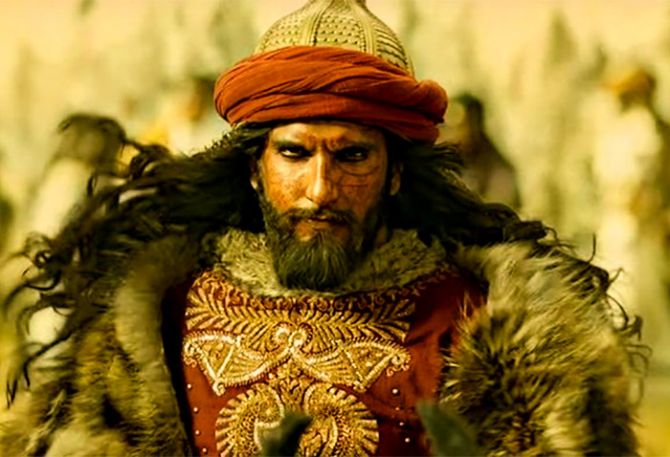From Gwalior to Ranthambhore, Chittor to Chanderi, jauhar is a recurrent theme in the history of that period.
Khilji was hardly the only Muslim invader whose onset forced women to self-immolate.
Nearly the entire Mughal clan, including the benevolent Akbar, forced jauhar on the defeated, says Vikram Johri.

IMAGE: Deepika Padukone in the jauhar scene in Padmaavat.
What was surprising about the reaction to Sanjay Leela Bansali's Padmaavat was how the nature of response to the film changed in the week of its release.
If it was the Karni Sena that threatened the release of the film due to what the group believed was the film's skewed portrayal of Rajputs, the film was criticised for other reasons once it hit the theatres.
Some, such as the news Web site The Quint, found the film divisive, because it portrayed Alauddin Khilji as an insensate marauder.
Others, such as Bollywood actor Swara Bhaskar, found the film sexist, because in her view, it glorified jauhar, the horrific act of self-immolation that Hindu queens and princesses practised to avoid becoming sex slaves to invading armies.
Both those responses encapsulate how quickly goal posts can shift around a cultural product if it fails to meet the expectations of a narrowly defined political correctness.
It would be easy, if grossly insensitive, to view jauhar through the prism of modern feminism, as Bhaskar did, except we don't have to do any imagining in this instance, since a modern-day equivalent of the fear that drove such an action has been witnessed in IS-controlled territories.
Accounts of Yazidi women who have managed to escape ISIS clutches are unanimous in their descriptions of how ISIS commanders treated them as slaves for their express sexual pleasure.
Nadia Murad, one such Yazidi girl who escaped ISIS and now speaks against the organisation at international forums, writes in painful detail of her time in captivity in her recent book, The Last Girl.
I am therefore surprised that the debate around the film focuses on the decision, carried out however horrifically, of a woman to escape a ruinous destiny rather than on the events that forced her to reach that decision.
The film presents the Hobson's choice before a Rajput queen whose husband has fallen to Khilji on the battlefield.
To say that Padmaavat glorifies jauhar is not just insincere; it is akin to asking that we sanitise history so that it does not discomfort our modern sensibilities.
I am also surprised by how little this aspect of our past is dealt with in popular history.
While Padmaavat itself may be fictional, it portrays events that are anything but.
From Gwalior to Ranthambhore, Chittor to Chanderi, jauhar is a recurrent theme in the history of that period. And Khilji was hardly the only Muslim invader whose onset forced women to self-immolate.
Nearly the entire Mughal clan, including the benevolent Akbar, forced jauhar on the defeated.

IMAGE: While Padmaavat itself may be fictional, it portrays events that are anything but. Seen here, Ranveer Singh as Allaudin Khilji in Padmaavat.
Especially disturbing is the campaign in some quarters to brand Khilji's portrayal in the film 'Islamophobic'.
Islamophobia has become a much-abused term to silence critics of Islam, but it is particularly disingenuous to employ that expression in this case.
If a woman was willing to throw herself into a vat of fire to protect herself from being converted into a sex slave, a 'phobia' was not just natural, but warranted.
Jews teach us that historical memory is important.
The community's collective efforts in academia, politics and global bureaucracy have ensured that the Holocaust is one of the most discussed and written about tragedies of the 20th century.
But, in India, our record of preservation of historical facts and data is abysmal, partly because everything in our country -- every issue, every debate -- is so deeply politicised.
Within days of the release of Padmaavat, the Karni Sena withdrew its protests. Its members may have watched the film and come to the conclusion that it contained nothing to be agitated about.
In retrospect, however, one can begin to see the source of their apprehension.
No one knows for certain today if Bhansali was planning a dream sequence between Khilji and Rani Padmavati in the film, but such a sequence would have been in very bad taste indeed.
Does that justify the violence the group perpetrated? No, but it certainly puts their demands in perspective.
The visual medium is a powerful tool to send out ideas and the diversity of those ideas creates a deeply contested terrain.
When we say that an artist has the freedom to depict whatever he wants, we are privileging creative freedom over other concerns.
This choice may be worth defending -- but the privilege inherent in it cannot be denied.
Historical memory, as intangible as creative freedom, can be an equally worthy goal.
How a society chooses between the two, without the threat of physical harm visiting anyone, is a question worth asking, one whose answer is not as obvious as some would have us believe.











